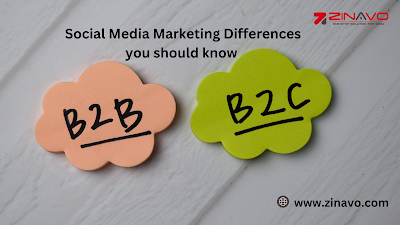B2B and B2C social media marketing differences you should know

Marketing on social media: Business to Business vs. Business to Consumer In the bustling arena of social media marketing, two key players dominate the field: Business-to-Business (B2B) and Business-to-Consumer (B2C) marketing. While both operate within the realm of social media, their strategies, goals, and approaches differ significantly. In this blog post, we’ll unravel the unique dynamics that define B2B and B2C social media marketing, shedding light on the nuances every marketer should know. Understanding the Audience: B2B Marketing: B2B marketing primarily targets businesses and professionals. The audience comprises decision-makers, stakeholders, and experts within a specific industry. Consequently, content must be tailored to address their pain points, industry trends, and the solutions your business provides. LinkedIn, with its professional user base, often takes the spotlight in B2B marketing strategies. B2C Marketing: B2C marketing caters directly to individual consumer...